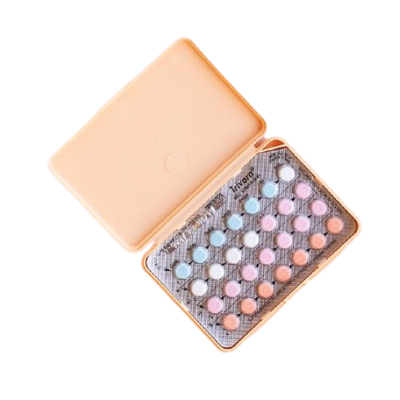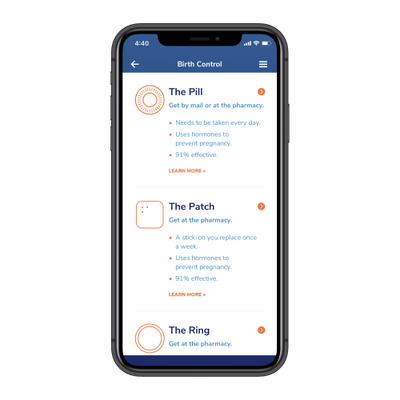
Should You Get Your Birth Control Delivered?
A very thorough review for getting birth control online.
Our firm take: Online services for obtaining birth control are a net positive for women.
Why? Remote consultations with licensed physicians offer the uninsured as well as the nearly 20 million women who live in contraceptive “deserts” (areas where there’s little to no access to health clinics that offer contraception) access to affordable birth control. On top of that, 40 million women live in states that are considered hostile to women’s reproductive health, and 86 percent of women say it has been crucial to their careers to be able to choose if and when to have children. Accordingly, online services that prescribe birth control have cropped up in droves.
We spent over 30 hours reading scientific research, testing 8 of these services and interviewing health experts to find out which of these services are worth using and who they’re right for. These are our recommendations:

We found that Nurx is inclusive and gives a ton of control to the patient.
Nurx has over 100 different birth control brands to choose from and will ask if you prefer the pill, the patch, the shot or the ring as your birth control method of choice. Some of the other services we tested don't ask what you (the patient) prefer, so this is a plus in our book. We also like that Nurx's branding isn't overly pink or girly and that they ask for both the gender you identify with and the gender you were assigned at birth.
Nurx’s pricing is fairly competitive with other services we tested, with a $15 medical consultation fee (which includes year-long texting with a Nurx health professional) and birth control pills starting at $15 per pack without insurance.
Something to note: Nurx was subject to a scandal in 2019 that raised questions about the safety of the service. However, a scientific study found the service to be safe to use for the most part.

We found that Pandia Health will go above and beyond to prescribe birth control based on your individual needs.
Dr. Sophia Yen, Pandia Health's CEO and co-founder, is a champion for making periods optional. There’s even a section on Pandia’s site that outlines how to safely skip periods using birth control. Pandia Health, a doctor-founded, doctor-led option for birth control online stands out to us through details like this; it feels like the closest thing to seeing a doctor in person.
Getting birth control through Pandia Health is affordable and you can apply for financial aid through the company’s birth control fund. The company also does six-week follow-ups for free, which we didn’t see on any of the other platforms. The biggest downside we found with Pandia is that it can only prescribe you birth control if you live in California, Florida or Texas, but they can ship birth control to any state if you already have a prescription.

We found that Pill Club was the most affordable and accessible of all the options we tested.
When we spoke to Dr. Amy Roskin, Pill Club's Medical Director, she told us that Pill Club is right for any woman who is interested in pregnancy prevention. While we agree, we think Pill Club stands out in its effort to provide affordable and accessible birth control to the masses. For people without insurance, Pill Club offers the cheapest birth control pills we've seen at $9 per pack. They're also the best solution for cash patients who want a year's supply of birth control — other services typically only offer only three months' worth of birth control to those paying with cash.
Pill Club ships to 41 states, which is huge. Their branding seems geared towards younger folks and they’ve definitely tapped into Gen Z’s love of free products; each birth control shipment also comes with goodies like chocolate, beauty samples and stickers.

Alpha offers a full suite of medical services for women
Getting birth control through Alpha checks a lot of our boxes. It's affordable, convenient and their customer service is seriously top-notch. While membership to Alpha's full suite of women’s health services costs $99 per yer, the cost of getting birth control through Alpha is cheap and consistent with many of the other services we tested. One small thing: the marketing on the company's website claims that it's "free" to get birth control through Alpha. It's not. A medical evaluation costs $10 through their site and your birth control would only be "free" with insurance.

If Twentyeight Health is available in your state, this is the birth control service we recommend using.
There’s a lot of things we love about Twentyeight Health. They give people all of the birth control options available to them online and their packaging is so discreet that we were confused by the non-branded parcel when it arrived during testing. They're also laser-focused on their mission to provide more accessible, affordable birth control to patients that are underinsured in the U.S.
Unfortunately, they can only prescribe birth control in Florida, Maryland, New York, New Jersey, North Carolina, and Pennsylvania (for now). The company accepts Medicaid in all of the states where it prescribes birth control and gives back some of its profits to the National Institute of Reproductive Health.

Planned Parenthood made a sleek, intuitive app where you can order birth control, UTI treatment and emergency contraception by mail.
Trust is built into the experience, with Planned Parenthood laying out all of your choices for birth control — the pill, the patch, the ring, the shot, the implant, and the IUD — as soon as you hit the app. We did not see this with any of the other services and it stands out as a transparent way to let patients know they have options. We also liked that there’s no visit fee to get a prescription and that you don’t need to sign in to the app before you decide whether or not you want to order birth control.

PRJKT RUBY is a solid option for those seeking generic pills without insurance
Important: generic birth control is more or less the same as a "brand name" birth control, but it's cheaper.
PRJKY RUBY only prescribes generics and it only prescribes the pill. We think PRJKT RUBY is particularly great in how widely available it is; the service prescribes birth control in all 50 states (!) except for North Carolina. It’s also affordable. Your medical consultation will be free, pills cost $20 per pack, and PRJKT RUBY will donate a month’s worth of birth control to a woman in a developing country for every pill pack you order.
Our Research
For this guide we talked to Dr. Mitchell Creinin, a veteran medical researcher and professor of obstetrics and gynecology at the University of California, Davis; Frances Kissling, an activist and scholar who is widely considered one of the most thoughtful proponents of international reproductive health rights; and Dr. Ateev Mehrotra, an associate professor at Harvard Medical School.
We also read through scientific papers on the safety and reliability of these online birth control companies, the accuracy of self-screening for issues with oral contraceptives, and why women should have unhindered and affordable access to birth control.
Our Process
In July, the Supreme Court upheld a Trump-era regulation that lets employers with religious or moral objections decline to cover birth control for employees or students, a decision that will likely lead to several hundred thousand people losing access to contraceptive coverage. Reports also show that birth control requests have doubled since the pandemic started. We wanted to look at these services because there’s never been more of a need for affordable, accessible birth control online.
The online birth control space is a crowded one and it’s important to know that the innovation among these services is in the way people access birth control, not the birth control itself. If you need help choosing what type of birth control to try, Dr. Creinin recommends researching different methods on Bedsider.org, and then using one of the apps listed above to get a prescription. “The best use of one of these apps is when a patient already knows what they want for birth control and they just need a refill,” said Dr. Creinin.
We started by scouring Reddit, Twitter, health blogs and YouTube for popular birth control delivery services. Then we asked a few health experts about what we should be looking for.
“In many areas of the country there is no Planned Parenthood and people live in contraceptive deserts,” said Dr. Ateev Mehrotra. “That’s something I try to remind myself when I look at these companies because that's the alternative.”
Frances Kissling agreed. “One of the problems around telehealth in general, and with things like birth control and abortion, is that these are medications and procedures where one of the advantages to telehealth is that these may be unavailable in your community,” she said. “So you have to weigh the good and the bad. For example, it could be the only way a woman can get a contraceptive in her community because her local pharmacy doesn’t dispense birth control to unmarried women. So in that sense telehealth is a good thing.”
With that in mind, we narrowed down our list using these markers:
- Accessibility. Where is the service available? Are the birth control options affordable?
- Choice. How many different types of birth control does the service offer? Do they inform people about other birth control options (like IUDs and implants) that need to be administered by a health professional in person?
- Transparency. Does the company have integrity? Are they upfront about the services they offer?
- Convenience. Is obtaining birth control using these services easy? Do they offer discreet packaging? Do they make it easy to ask questions to a healthcare professional?
We decided to test Nurx, Pill Club, Simple Health, Pandia Health, Hers, PRJKT Ruby, Planned Parenthood Direct, Alpha and Twentyeight Health using this framework. Then we ordered a ton of birth control.
Across the board in our testing, an online doctor visit to get birth control only took minutes and a prescription arrived at our doorstep within days. All of these services screen for unsafe health conditions (i.e. a history of blood clots, migraines, high blood pressure, etc.). “The majority of these apps are using algorithms that are potentially safer than just using your doctor who might not be as complete,” said Dr. Creinin. “At least you know that they are really making sure that all of the important stuff is checked.”
Important to note: most of these sites will require you to place your order before knowing what a doctor will prescribe you unless you specify a certain brand of birth control that you want.
What we didn't like
A 2019 study of these services called out their failure to counsel patients about other forms of birth control they don’t provide, such as long-lasting, reversible options like the IUD. “We know that oral contraception and condoms are not perfect, and in contrast an IUD is so much more effective,” said Dr. Mehrotra, who is one of the authors of the study. “What I get the most worried about is that [these companies] will move more women away from longer-acting and effective contraception such as the IUD.”
It’s a good point worth repeating: all of these services are limited to providing the pill, the patch, the ring and the shot. While that’s not a bad thing, we did dig into whether or not these companies educate women about other, more effective options. We searched through company blogs and FAQ pages and were able to find educational information about the IUD and implant on every site we tested except for Pill Club. Planned Parenthood Direct was the only service to offer up educational information on the IUD and implant when we filled out their online questionnaire to get a prescription.
Of the nine different services we tested, Hers stood out as particularly bad. Hers is the sister site to Hims, an online destination for drugs to treat erectile dysfunction and hair loss in men. The company is enticing with sleek, modern branding, but ultimately does a disservice to underinsured patients who are trying to get birth control. Hers doesn’t accept insurance and charges $30 per month for birth control pills; you can get birth control pills without insurance for significantly less using Nurx, Pill Club, Pandia Health, Alpha, Planned Parenthood Direct, PRJKT Ruby or Twentyeight Health. Their customer service was also difficult to reach and their packaging wasn’t discreet — our birth control pills came in a tiny box with the “Hers” logo on it.
We also didn’t like Simple Health when we tested it. The company was previously a contact lens delivery service and after making the hard pivot from contacts to birth control, they’re doing just an okay job. Their pricing and availability is competitive with other services we liked and tested, but a quick search for other reviews on the internet confirmed that their customer service is really bad, so we can’t recommend them at this point.
Closing thoughts
Most of these services are super safe to use and a convenient way to get your birth control delivered to your doorstep, especially depending on where you live. To drive home Dr. Creinin’s point: these services are used best when you already have a birth control prescription or have an idea of what type of birth control you want.
In our chat with Frances Kissling, she reiterated the importance of these services being transparent with patients given that telehealth is still in somewhat of its wild west days.
“For every telehealth visit, there should be a one-page fact sheet that patients receive before their consultation by telehealth, like a patient bill of rights that outlines what things patients must expect to happen during their visits,” said Kissling. “If you’re going to do birth control by telehealth, patients should know what to expect from and what to ask the provider because the provider is not necessarily going to tell them.”
So we can’t stress enough the importance of personal research alongside using these services. But also, these services are a good jumping-off point for research. Check out their blogs! Ask their health professionals questions! Most of them have invested a ton into creating robust educational resources you can learn from in order to find the right birth control for you.
Disclaimer: The above information is for general informational purposes only and is not a substitute for professional medical advice. Always seek the advice of your doctor/primary care provider before starting or changing treatment.
Our Sources
1. Jain, Tara et al., A Study of Telecontraception, The New England Journal of Medicine
2. Grossman, Daniel et al., Accuracy of self-screening for contraindications to combined oral contraceptive use, Obstetrics and Gynecology
3. Access to Contraception, The American College of Obstetricians and Gynecologists